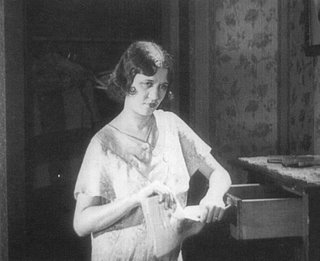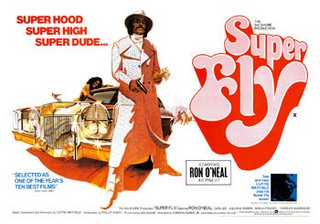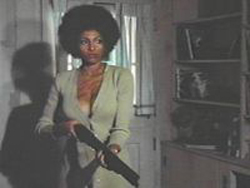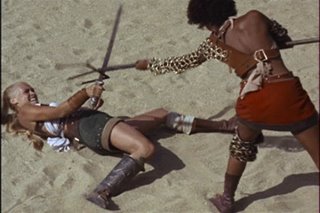
(The Scar of Shame, 1927, directed by Frank Peregini. I understand Micheaux's predominant theme was 'passing'--I've only seen one for myself; this similarly seminal film of the silent black American cinema, on the other hand, is foremost about class and color tone divisions among black people exclusively, if I recall.)

Fred Hampton after he was murdered by the police.

Superfly.


"Don't fuck with Pam Grier," we are told forcefully enough by images like these.
What I'd like to suggest, one topic or tangent I want to introduce, is the question of black Americans' "space of their own" in cinema--that means literally on-screen but also in terms of exhibition or consumption. There was the cinema of Micheaux and up through Spencer Williams, Jr.--respectable cinema, or so I suppose its reputation holds, for and usually by black people. The 1960s (David Ehrenstein relates here that Billy Wilder's The Apartment was a watershed moment for the hiring of black extras in H'wood, by the way) had what I figure to be an entrenchment of two dominant cinematic/media image-sets of blackness in America. There is blackness as a well-behaved victim (child or chaste adult), Mockingbird blackness, Poitier blackness: truly dignified at best, horribly condescending and racist at worst. Perhaps both at the same time, quite often. Then there is blackness as a threat, very strong and masculine and separatist: the Black Panthers, for instance. I could be wrong about this: I'm still a fumbling student of the issue: but it's my impression at the moment.
The black exploitation film as a tool in the process of social control?--better for a dominant white class to peddle fantasies of black power to black audiences after so many of its political leaders had been assassinated, than to have said leaders making real strides. What became "blaxploitation" started off as a tool, an expression, of black individuals and communities. Melvin Van Peebles made Sweet Sweetback's Baadasssss Song ('71) on his own. And it was attuned to something deep, powerful. But around the same time, Hollywood was allowing black people to finally make their own films--under the aegis of Hollywood and its money, presumably for black audiences, but not independent for themselves. Gordon Parks made the first such film in The Learning Tree ('69, a good film though I saw it years ago, don't recall it too well). Blaxploitation soon became a moneymaking tool for your standard, white-owned, white-run companies. Black actors starred in movies (at least nominally?) targeted to black viewers, but by and large I don't believe these films produced for the black community/ies of America.
What I want to critique--assuming there are not parts of the equation which I have yet to discover which would negate the basic criticism--is the exploitation of distinctly black film workers and audiences for distinctly white profit. But. I don't want to dismiss this genre altogether for the circumstances of its production. I want to look into it, see more than the handful of films I have already seen, figure out what it says and what it might say. I would like to learn to what extent, and in what nature, the genre might have been a genuine "space" of black Americans' own. I have a decent initial grasp of the available bibliography, but if there are hidden gems to be read (or seen), please let me know. I also did not see Mario Van Peebles' recent documentary, though I will. This is the foundation: what I want to go into is analysis (or even "poetics"--a non-Bordwellian sort of film poetics?) ...
* * *
... and ... on the nature of Elusive Lucidity these days, I have to admit that I am apprehensive of alienating the small group of people who read this blog. I am grateful for any and all readers I have (though at the same time I basically dislike bringing up my work to people who don't know about it: I feel the only readers I earn are those who find me and decide the writing is worth a return peek). I know that this is essentially a cinema blog. And I want to keep this a cinema blog, because if I am good at keeping a blog about anything, it must be that. But for months now (actually, really, maybe it's a process of years) I have felt a mounting personal pressure about politics, and greater and greater self-resentment for not doing anything about it. I feel a paralysis because of this--a paralysis of my creative and analytical faculties both. When I read sites like Venezuelanalysis, Brownfemipower, Corpwatch, or countless others, I am overcome with the urge to have my own meager screen musings online reflect the passion & hopefully commitment that these sites--these people--inspire in me. (As to how well I translate that into real life, too, well, that's another part of the challenge.) I make zero apologies for my politics; at the same time I make zero demands of my readers, politically. I understand that there are a few conservatives and libertarians, and probably a majority of liberals/Democrats, among my readership, and I consider myself none of these. So in discussing moving images I hope that my hospitality and my convictions work together organically, and I hope that I can essentially, eventually do more than preach to a choir either politically- or cinephilically-speaking. There--that's off my chest with #201.

10 comments:
Great post, Zach. And congrats on two hundred!
As a big EL fan, I'd be all in support for it becoming a cinema-cum-politics blog if you so wished it....
Re: the two 1960s image/media views of blackness, a small but notable exception might be Travers in Bunuel's great The Young One, who might transcend these somewhat: he is dignified but not condescended to or sentimentalized; 'masculine' but nevertheless all-too-human...
Durgnat on the film:
"Bunuel's film translates into a personal situation the Marxist view of economic man as basically a tool-using, object-making animal. Here guns sink boats, grenades are stronger than guns, and clarinets are trumps [...] In its stress on the material, the productive, on subsistence and trade, and in its study of the contradictions within people, in the intricate dialectic of its dramatic improvement, The Young One is Marxism in dramatic action as few left-wing works of art have ever been."
Zach, I'm no expert on this genre, but I just wanted to say that your thoughts made me think of many things - from contemporary mainstream hip-hop, to the relative scarcity (or, I should say unavailability, since perhaps the 'public' is still not ready for them in some ways) of films dealing with gender and sexuality in the black community (I only know films like Illusions, A Different Image, Tongues Untied - films which probably fall just outside your inquiry here? - by reputation), to films like Car Wash (1976), which acknowledges (by giving into it?) the capitalism inherent in 'mainstreamed' blaxploitation films: black workers are employed at a white-owned business, serving (from memory) a mostly white community.
Congrats on the 200 posts! I hope you continue to move and enrich your readers, while pursuing your interests. I'll be here, reading.
As a reader, I very much look forward to following Elusive Lucidity in any direction you decide to take it. I've enjoyed some of your posts on food and the World Cup very much, even though as a vegetarian and a football near-ignoramus I wasn't quite able to appreciate them at the level that they were composed. But hey, I could say the same about some of your film posts too (such as those on films, filmmakers and critics I'm not familiar with). You never write on these topics as if you were a gatekeeper of an exclusive club. I'm certain I'll find any political writings you place here worth my time. Even if they fit under the descrption "challenging" one way or another.
You're doing well Zach.
For what it's worth, I think politicizing film theory can be alienating to the extent of turning cinema in a mere excuse to illustrate a political ideology (in the eye of the reader). Maybe I just want a critical thinking too "neutral" that embraces an unpolarized whole.
Anyway (even if I try to stay away from political controversies, but that's because the subject of cinema is big enough of itself) I encourage you do add everything you like to your blog, because it shall represent your state of mind rather than trying to please an hypothetical readership by censoring yourself.
All you don't write now, you will never write it as well when older... if at all. ;)
OK--thanks for the feedback, I can stop my "handwringing" as Joel put it in the previous post's comments. (I'm a handwringing kind of guy sometimes.)
Girish, there are definitely exceptional images of blackness from the 1960s. (Another good instance, also by a white director: Michael Roemer's Nothing but a Man.) Haven't seen the Bunuel ... yet.
And Mubarak, the history of black labor (behind cameras or in front of them) in American cinema is of course loaded with racially coded exploitation. What interests me with blaxploitation specifically, aside from the issue of the pun and what "exploitation" really means for the genre, is that this film was selling black power and self-determination to its audience. In Coffy, there are even scenes where politicians (a crooked and mercenary politician, it turns out) directly describe the way in which blacks are exploited by whites who make larger profits is (he's talking about drugs though)! So to what extent do these films tell the truth, how and when do they choose to veil this truth (for instance, making the politician's speech a sign of his wicked calculations)? What messages are these films giving--I don't know that you can do a simple thematic/textual analysis for an easy message in these cases, because it's so ambiguous, so it's necessary to break down the films in terms of form, analyze it, and also to look at historical studies of how audiences of different kinds (and at different times) have reacted to such films.
Brian, thanks, I can only attempt to live up to your appraisal. (And I'm kinda thinking of temporarily going back into vegetarianism after my uncharacteristic, heart-stoppingly meat-heavy consumption yesterday: an Irish breakfast and then a Chinese meal that included roast duck, shrimp dumplings, pork omelette, and boiled chicken ... and some blessed chinese broccoli!)
Harry, thanks also for your comments; illustrating an ideology is definitely not what I want to do on EL--I'm still figuring out how to critique films politically; I still haven't mastered the problems set out by Serge Daney's essay on the critical function; but I'm aiming for a sort of analysis that is neither an a priori, fill-in-the-blanks crypto-leftism (i.e., 'this film is good because it represents this group of people well, case closed') nor a devaluation of political process in the name of aesthetics ('this film is morally/politically reprehensible but I love it anyway because cinema is more than politics'). The postulate I go by is that politics and aesthetics are not possible to be teased out from one another. One can't "rescue" aesthetics from politics; one can't read "purely" politics because doing so will likely reproduce (conservative) ideological constrictions and biases that aesthetic, formal, etc. analysis hopes to help undermine.
I'd love to hear your thoughts on Sweet Sweetback's Baadasssss Song. I saw it for the first time last night and couldn't intuit the reasoning for its curious film grammar, though I'm sure there is one (perfectly obvious to some or even most people, just not to me).
Tuwa, I'll try to get some thoughts on Sweet Sweetback soon. I need to re-watch it myself.
I know it's not what you do Zach, my reply was of general concern. There is only good criticism with political consciousness. But regular reviews are already too easily biased by choirs mentality. And that's what distract me sometimes with Daney (or Godard), when I get the impression the political militant tremples the art critic. Like this thing about the the "bourgeois travelling"...
However his essay on "La Fonction Critique" is fundamental (although I skipped his political references because I haven't read Marx's Capital).
Personaly I'm more on the side of saving art despite it's political shortcomings because art is a time-marker and only aesthetical values shall apply. Politics is only a subtext. It's more important to understand the nazi art with Leni Riefenstahl than to burn her films. Studying films doesn't mean to condone or support their ideologies. If there are "leftist critics" and "rightist critics", it's such an arbitrary secession within the larger scope of cinema aesthetics. IMHO art always supercedes the local/punctual/transitory/subjective/narrow political perspective.
But it's ok if you think otherwise. Your posts don't seem militant to me.
"All you don't write now, you will never write it as well when older... if at all. ;)"
I love this comment by Harry.
It's got me thinking. Too often I second-guess myself saying, "I'm not quite ready to write about this," or "How will this be received?", or "Will this sound naive?" or some such nonsense...
Zach, I would echo what Harry and Joel said: feel free to write whatever you feel and think. I am confident that both you and your readers will be the richer for it.
Harry, when you write:
Personaly I'm more on the side of saving art despite it's political shortcomings because art is a time-marker and only aesthetical values shall apply. Politics is only a subtext.
I am not in favor of banning or flatly rejecting art as a matter of course (and I'm not saying you're accusing me of such); however, I would part ways in saying that politics is only a subtext. Or rather, maybe it's simply that politics and social relations are more important than art--my "opinion" merely, but not one I hold lightly as a moral postulate--and thus I want to make sure my priorities aren't inadvertently reversed when I deal with an artwork. It's not that I think aesthetics should be subordinated to politics (at least not in the ways we normally think of such a sublimation: summary, systematic, brutish), it's that I want to get better at 'thinking aesthetics' within politics.
I've never seen any films by Riefenstahl actually--she's one of the little fringe of major filmmakers I've never seen anything by. But I am an admirer of certain conservative filmmakers, in certain contexts, and for certain reasons. Its the contexts and reasons that matter, though, in conversation and in criticism. I don't want to find myself saying, "I love these conservative/rightist/bourgeois films for what they are as aesthetic objects, their politics don't bother me because it's a merely historical blip and aesthetic joys last longer." I don't buy that line. In the past, I might have, but no more. Now I'm more inclined to summarize my approach thusly: "I accept the limitations that these films come with in the real world; here are some conditions under which they remain enjoyable/useful/etc."
Ford is one of my absolute favorite filmmakers, and surely one of the most politically muddled. From his work one can extrapolate scathing indictments and affirmations on the progressive side, as well as horrific collusion and lazy fantasies on the rightwing side. I'll spend my whole life trying to negotiate my way through the Fordian political bog!
Post a Comment